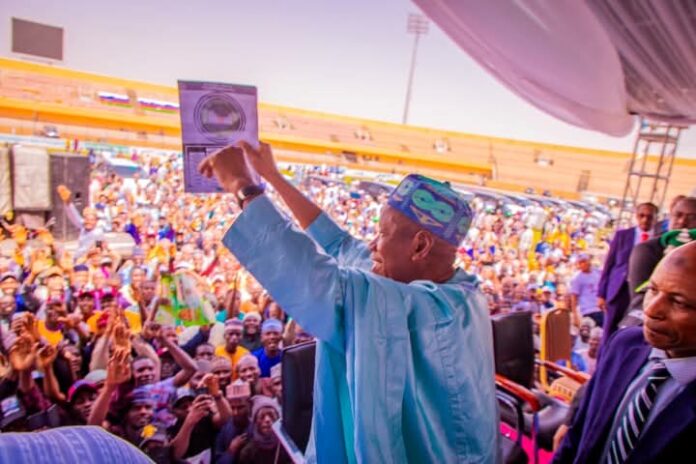Umar Idris Shuaibu, Kano
In Nigeria’s dynamic political landscape, leadership is not just about occupying a position, it’s about restoring vision, strengthening institutions, and laying the foundation for long-term relevance.
Since becoming National Chairman of the All Progressives Congress (APC) in August 2023, Dr. Abdullahi Umar Ganduje, OFR, has emerged as a steadying force, guiding the ruling party through a critical post-election period with a focus on unity, reform, and strategic growth.
At a time when many feared internal collapse and ideological drift, Ganduje introduced a new approach centered on party healing, internal democracy, digital innovation, and national expansion. His early efforts are already reshaping the APC’s structure and future outlook.
Fostering Unity and Healing Divides
Upon assuming leadership, one of Ganduje’s first priorities was addressing the internal conflicts that had weakened party cohesion. Despite the APC’s success at the 2023 general elections, it was plagued by legal disputes, leadership tussles, and factionalism in key state chapters.
Ganduje opted for reconciliation through grassroots engagement, quiet diplomacy, and inclusive dialogue. By bringing together opposing factions in politically sensitive states, he helped prevent mass defections and restored internal trust.
This approach not only stabilized the party but also reinforced its image as a unified political family. His formula was simple: listen, engage, and reintegrate.
Driving Internal Reforms
Recognizing the shifting expectations of Nigeria’s politically aware electorate, Ganduje initiated a series of reforms aimed at strengthening the party’s internal democracy. Under his leadership, the APC began to move away from candidate imposition and opaque primary processes.
The reforms introduced include:
– More transparent primaries anchored on local consensus or fair competition
– Support and encouragement for women and youth aspirants
– Updated internal guidelines to ensure greater inclusiveness and accountability
These measures have started to rebuild credibility in the APC’s selection process, particularly at the grassroots level, where political legitimacy is often tested first.
Broadening Political Reach
Ganduje is also leading efforts to expand the party’s influence into new territories. Regions such as the South-South and Southeast, previously less aligned with the APC, have become focal points for engagement.
Through membership drives, stakeholder consultations, and alliance-building, the APC is slowly establishing its presence across a broader national map. This expansion is crucial as the party seeks to evolve into a truly pan-Nigerian platform ahead of the 2025 elections.
Embracing Digital Innovation
One of the most forward-thinking aspects of Ganduje’s leadership has been the push toward digital modernization. Recognizing that modern political parties must go beyond analog systems, he has overseen the digitization of several party operations, including:
– A nationwide e-registration system for members
– Online platforms for party dues and nomination processes
– Digital communication tools to engage youth and remote supporters
This transition to tech-driven operations is enhancing transparency, accessibility, and voter mobilization, key ingredients for competitive edge in future elections.
Positioning for the Future
Ganduje’s leadership is shaping the APC not just for immediate gains but for long-term sustainability. He has succeeded in attracting new members, while ongoing negotiations hint at more high-profile defections to the party.
With the 2025 elections on the horizon, the APC’s ability to remain competitive may depend heavily on the foundation being laid today. If the party navigates its challenges and emerges stronger, much of the credit will go to Ganduje’s steady hand and reform-driven leadership.
In the end, his chairmanship is not merely an administrative role, it is a mission to transform the APC into a resilient, inclusive, and forward-looking political institution.



